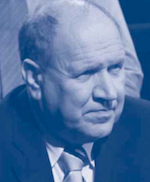In itself, this is of course not a new realization. Thomas Hobbes argued the same back in the 17th century. But we do not live in Hobbes’ era; we have now even left the Cold-War-era age of nuclear anxiety behind. Since the second half of the 20th century, and in particular since the crumbling of the Soviet Union, dubbed the Evil Empire by US President Ronald Reagan, humankind has marched – seemingly in seven-league boots – toward a new world that adheres to more humane principles.
Back in my childhood, in the 1950s, “human rights” was not yet a household phrase. All the things that we in occupied Eastern Europe complained about were our missing civil rights. We did not enjoy freedom of expression or freedom of assembly; we lived in fear of censorship of our ideas if they ran against the current, to say nothuig of punishment for utterances deemed inappropriate. So the fact that we have moved past civil rights to human rights themes – often in a very specific sense – is certainly progress and cannot be underestimated.
The question of securty is still on the agenda – both physical security and so-called structural security, the latter referring to the fatal outcomes of actions that were not expressly intended to cause suffering. For one thing, war, civil war, revolution and poverty have not disappeared from our Earth. In the global village, events in geographically remote areas find their way home to us all in some manner. Secondly, international relations are still hard to predict thanks to the abundance of variables and even in the most stable environments violence can strike like a bolt from the blue, if unfavourable circumstances should collude.
With this in mind, this issue of World View is dedicated above all to security themes. The focus, as always, is mainly on Estonia. Happy reading and thinking!
Mart Helme
Ambassador






